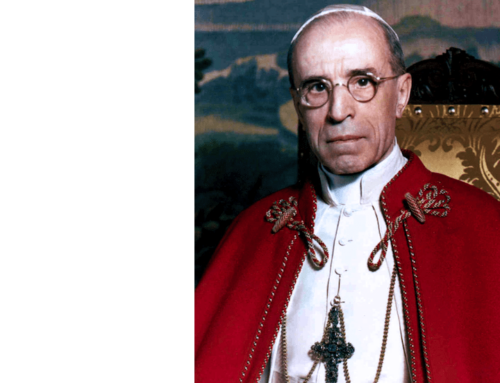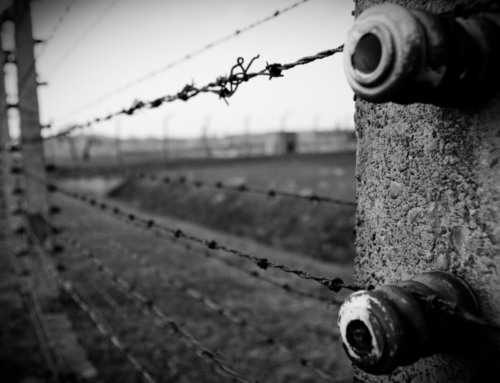Catalyst, June 2000
For nearly 20 years after World War II, Pope Pius XII (1939-1958) was honored by the world for his actions in saving countless Jewish lives in the face of the Nazi Holocaust. His death on October 9, 1958 brought a moment of silence from Leonard Bernstein while he conducted at New York’s Carnegie Hall. Golda Meir, future Israeli Prime Minister and then Israeli representative to the United Nations, spoke on the floor of the General Assembly: “During the ten years of Nazi terror, when our people went through the horrors of martyrdom, the Pope raised his voice to condemn the persecutors and commiserate with the victims.”
Among the Jewish organizations in the United States alone that praised Pope Pius XII at the time of his death for saving Jewish lives during the horror of the Nazi Holocaust were the World Jewish Congress, the Anti-Defamation League, the Synagogue Council of America, the Rabbinical Council of America, the American Jewish Congress, the New York Board of Rabbis, the American Jewish Committee, the Central Conference of American Rabbis, the American Jewish Committee, the Central Conference of American Rabbis, the National Conference of Christians and Jews and the National Council of Jewish Women.
Yet, four decades after the death of Pius XII he is condemned for his “shameful silence” in the face of the Holocaust. He is commonly accused not only of silence, but even complicity in the Holocaust. He is called “Hitler’s Pope.” When critics are reminded of the universal praise he received from Jewish organizations in life and death, such praise is dismissed as merely “political” statements, as if those Jews who had lived through the Holocaust would insult the memory of the millions killed for some ephemeral political gain.
When Pope John Paul II issued his historic apology for mistakes and errors in Christian history, he was savaged by pundits and news reports for his “silence” in regard to the alleged “silence” of Pope Pius XII. Lance Morrow in Time magazine, referred to the Church’s “terrible inaction and silence in the face of the Holocaust” and described any defense of Pius or the Church as “moral pettifogging.” He made such statements without bothering to substantiate them because the charges are simply accepted as “fact” and any disagreement becomes on a par with those who deny the reality of the Holocaust itself.
The historical reality of the pontificate of Pius XII has nearly been lost in the face of the strident campaign against him. Anti-Catholicism thrives on invented history that becomes part of the accepted cultural corpus. Conventional historical wisdom is more often the creation of propaganda than fact. Contemporary Catholics are witnessing the creation of a myth in regard to Pius XII, a propaganda campaign as relentless as any created by 19th century anti-Catholic apologists.
The view of Pius XII as Nazi collaborator did not begin as a case study of historical revisionism. It did not even begin within historical studies themselves or from available historical documentation, including transcripts of the Nuremberg trials, or government records made public. The myth of Pius XII began in earnest in 1963 in a drama created for the stage by Rolf Hochhuth, an otherwise obscure German playwright born in 1931.
Hochhuth was part of a post-World War II trend in theatre called “Documentary Theatre” or “Theatre of Fact.” The trend grew out of an American form of theatre popularized during the Depression. The point was to adapt social issues to theatrical presentation by utilizing documentation. The documentation was more important than artistic presentation and provided the script for the play. It was seen in more recent times with Vietnam War morality plays that excerpted from the Pentagon Papers, or presentations where the dialogue was directly culled from the White House tapes of Richard Nixon.
Hochhuth, however, created a more traditional theatrical presentation without any documentary basis when it came to Pius XII. Though claiming to be part of the “Theatre of Fact,” his presentation against Pius did not have the documentary sources for this style of drama. Turgid in length, in 1963’s Der Stellvertreter (The Representative or The Deputy) Hochhuth charged that Pius XII maintained an icy, cynical and uncaring silence during the Holocaust. More interested in Vatican investments than human lives, Pius was presented as a cigarette-smoking dandy with Nazi leanings. (Hochhuth also authored a play charging Winston Churchill with complicity in a murder. No one paid much attention to that effort.)
The Deputy, even to Pius’ most strenuous detractors, is readily dismissed. Even as vicious a critic of Pius XII as John Cornwell in Hitler’s Pope describes Der Stellvertreter as “historical fiction based on scant documentation…(T)he characterization of Pacelli (Pius XII) as a money-grubbing hypocrite is so wide of the mark as to be ludicrous. Importantly, however, Hocchuth’s play offends the most basic criteria of documentary: that such stories and portrayals are valid only if they are demonstrably true.”
Yet The Deputy, despite its evident flaws, prejudices and lack of historicity, laid the foundation for the charges against Pius XII, five years after his death. There was fertile ground. Pius XII was hated by certain schools of post World War II historians for the anti-Stalinist, anti-Communist agenda of both his pontificate, and the Catholic Church in general. In the heady atmosphere of leftist academic circles, particularly in Italy in the late 1950s and throughout the 1960s, the charge against Pius was that while he was not necessarily pro-Nazi during the war, but that he feared Communism more than Hitler. For the most part, this was based on the pope’s opposition to the Allied demand for unconditional German surrender. He believed such a demand would only continue the horror of the war and increase the killing. That stand was later interpreted as a desire on the pontiff’s part to maintain a strong Germany as a bulwark against communism. Hochhuth’s charge of papal “silence” fit that revisionist theory.
The theory, of course, was as much fiction as Hochhuth’s play. There was no documentary evidence to even suggest such a papal strategy. But it became popular, particularly among historians with Marxist sympathies in the 1960s. Even this theory, however, did not extend to an accusation that the Pope “collaborated” in the Holocaust, nor to any charge that the Church did anything other than save hundreds of thousands of Jewish lives. However, it did provide a mercenary rationale of “politics over people” in response to the Holocaust and applied such barbarous reasoning to the pope.
The Deputy, therefore, took on far greater importance than it deserved. Instead of Pius being seen as a careful and concerned pontiff working with every means available to rescue European Jews, an image was created of a political schemer who would sacrifice lives to stop the spread of Communism. The Deputy was merely the mouthpiece for an ideological interpretation of history that helped create the myth of a “silent” Pius XII doing nothing in the face of Nazi slaughter.
There was also strong resonance within the Jewish community at the time The Deputyappeared. The Jewish world had experienced a virtual re-living of the Holocaust in the trial of Adolf Eichmann. A key figure in the Nazi Final Solution, Eichmann had been captured in Argentina in 1960, tried in Israel in 1961 and executed in 1962. For many young Jews, Eichmann’s trial was the first definitive exposure to the horror that the Nazis had implemented. At the same time, Israel was threatened on all sides by the unified Arab states. War would erupt in a very short time. The Deputy resonated with an Israel that was surrounded by enemies and would be fighting for its ultimate survival.
Despite the fact, therefore, of a two-decades-old acknowledgment of papal support and assistance to the Jews during the War, Hochhuth’s unfounded charges took on all the aspects of revelation. In a column after Pope John Paul II’s apology, Uri Dormi of Jerusalem described the impact: “The Deputy appeared in Hebrew and broke the news about another silence, that of Pope Pius XII about the Holocaust. The wartime Pope, who on Christmas Eve 1941 was praised in a New York Times editorial as ‘the only ruler left on the continent of Europe who dares to raise his voice at all,’ was exposed by the young, daring dramatist.”
It seems ludicrous that a pope praised for his actions throughout the war – and by all leading Jewish organizations throughout his life – could be discredited based on nothing more than a theatrical invention. Yet, that is what took place and has taken place since. A combination of political and social events early in the 1960s, biased historical revisionism, and an exercise in theatrical rhetoric, created the myth of the uncaring pontiff in contradiction to the clear historical record. The myth thrives because people want to believe it rather than because it is believable.
Great strides had been made in Catholic-Jewish relations during the papacy of John Paul II. Yet the myth of the silence of Pius XII has helped to entrench anti-Catholicism within elements of the Jewish community, while creating in certain Catholic circles resentment that can only be harmful. Leaving this myth unanswered can only do great damage to what should be a deep relationship between Catholics and Jews, generated in part by the heroism of Pope Pius XII in saving Jewish lives during the Holocaust.
Copyright © 1997-2011 by Catholic League for Religious and Civil Rights.
*Material from this website may be reprinted and disseminated with accompanying attribution.



